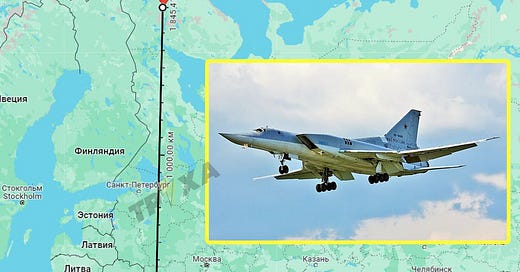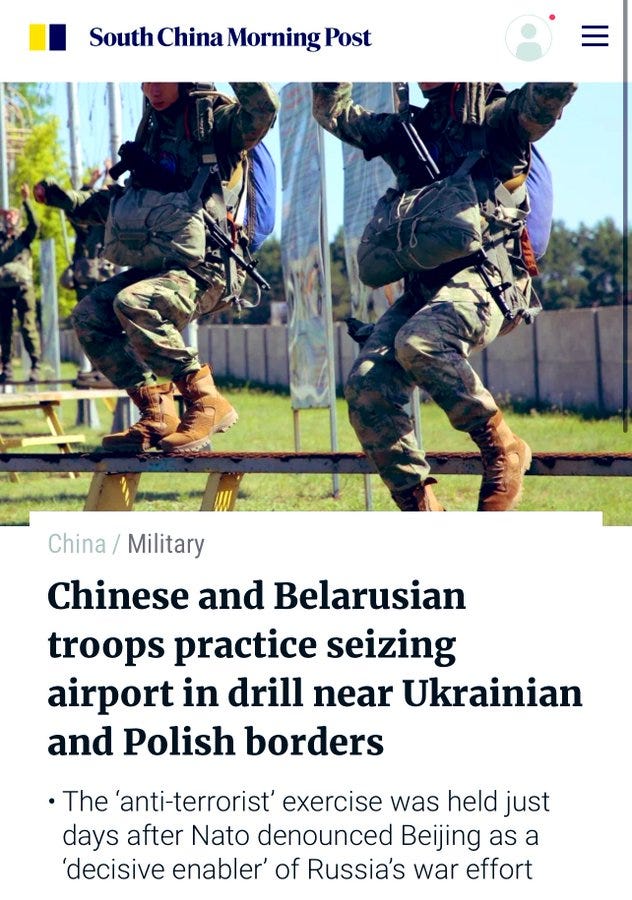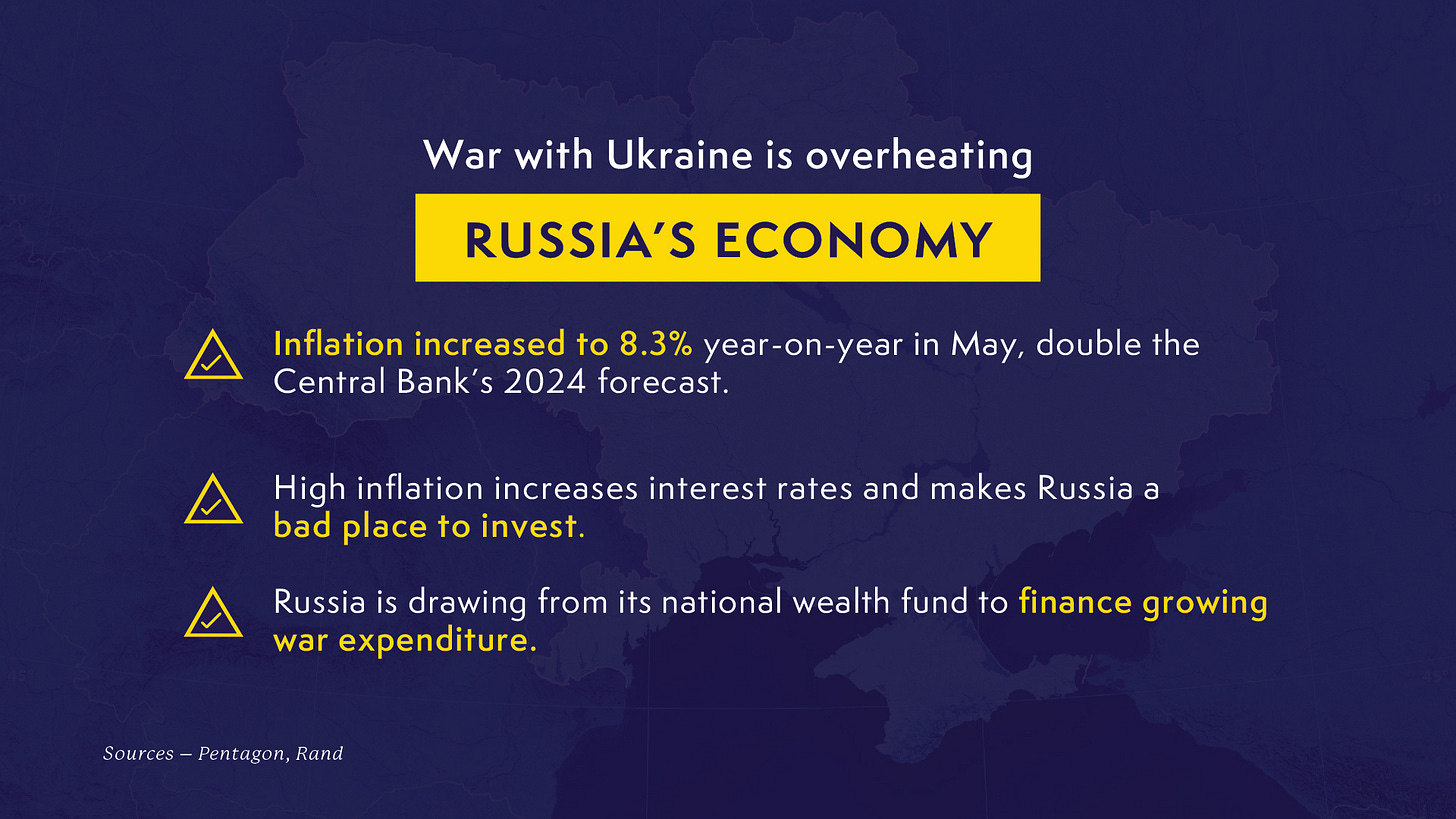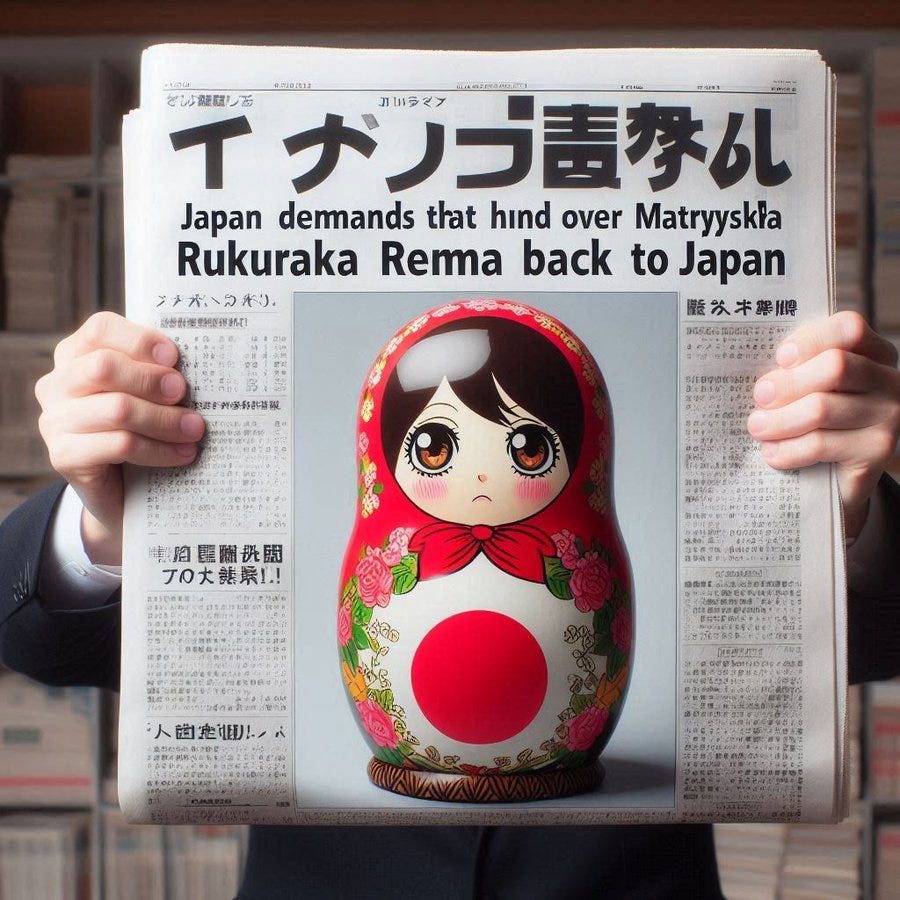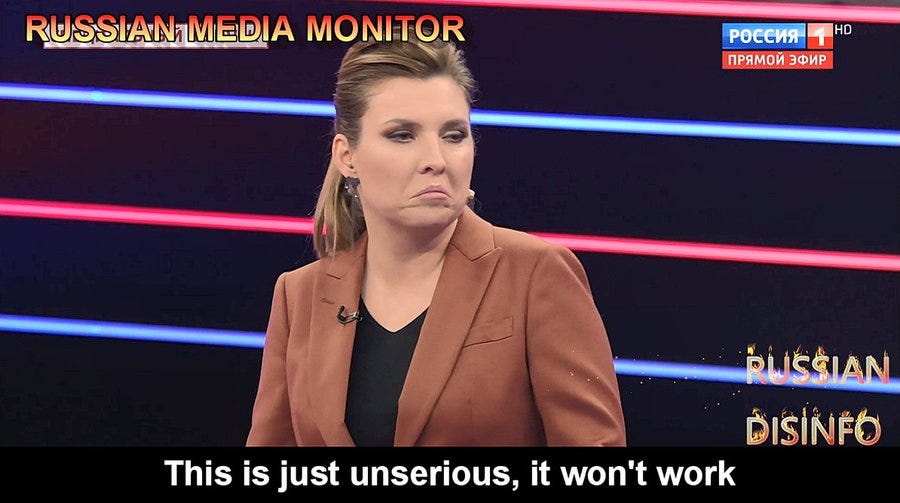Jul 27: E-Stories
RUstrikes CombatSit BehindLines InRussiaCNHun Allies A&P Beketova ISW Noel UKDef United24 Dion Zelensky EUCouncil Orban Braw Kyslytsya Brady Vexler Trump Raufoglu Davis CNN DFRLab InsideStory IWP
Catching up…
EA Worldview’s Ukraine Up-date- hop over to Scott’s amazing hourly Ukraine up-date page. I’ll fill in with some bits and bobs.
Reminders: Georgians still battling their Russian-aligned government—elections in October; Venezuela goes to the polls on Sunday; sabotage acts under investigation in Europe; Trump getting desperate; Paris Olympics 2024 opening ceremony yesterday evening. In the video below, Céline Dion performed Edith Piaf’s “L’Hymne à l’Amour”. I’m not a Céline fan, but this moved me.
Stories we’re following…
The air force of the armed forces of Ukraine said Russia has increased the number of “ballistic” strikes over the past few months, forcing Ukrainian forces to think more about “passive defence” tactics such as camouflage and using “false positions”.
President Zelensky: Today, Olena Zelenska and I visited the National Specialized Children's Hospital “Okhmatdyt”. We spoke with the children who are undergoing treatment. Despite everything, the institution is resuming its normal operations and rebuilding its strength after the Russian attack. I thank everyone who is helping the hospital, those who were on site after the Russian missile hit, clearing the rubble, and supporting the children. I also extend my gratitude to everyone around the world who has sought solutions to support Ukrainians.
Ukraine's energy situation improving, state grid operator says. After a "very difficult couple of weeks" due to record-breaking heat and power plants being under repair, Ukraine's energy supply situation is improving, Volodymyr Kudrytskyi, the head of state grid operator Ukrenergo, said on July 26.
The history of Crimea and southern Ukraine spans all the way back to antiquity, and its Hellenistic colonisation and influence. This is a really cool video.
Сeasefire would leave 25% of Ukraine under Russian control, ambassador says. "Many countries have proposed the idea of a ceasefire, but no one thinks about what it means. Some 25% of Ukrainian territory would remain under Russian control, which means buying time for Russia to strengthen its capabilities and resume its attacks on Ukraine," Ambassador of Ukraine to Turkey Vasyl Bodnar said.
IWP: A Talk with Elina Beketova—Life and Death in the Occupied Territories
Elina Beketova shares her personal experiences and insights into the tactics used by Russia to control and influence the local population, particularly the youth, as well as the various forms of resistance and defiance against the occupation. The discussion also explores the challenges faced by Ukraine and the international community in addressing the crisis and the need for a more proactive and coordinated approach to deter Russia's aggression and support Ukraine's efforts to regain control of its territories.
Combat Situation Update
Near New York and Toretsk, enemy advances have been halted at this point, but they continue their assault attempts, according to the commander of a platoon from the 95th Separate Air Assault Brigade of the Ukrainian Armed Forces.
As a result of sabotage operations on Russian territory, three enemy helicopters were hit, reports the press service of the Main Intelligence Directorate of the Ministry of Defense, UP interlocutor in the department.
On July 24, 2024, a military multi-purpose Mi-8 helicopter burned down at the Kryazh airfield in the city of Samara.
On July 21, in the village of Tomilino near Moscow, two more helicopters of the aggressor state were hit by fire - an attack Mi-28 and a multi-purpose Ka-226.
Ukraine hit Russian airfield in occupied Crimea, General Staff confirms. The General Staff of Ukraine's Armed Forces confirmed that Ukraine hit Russia's Saky military airfield in occupied Crimea overnight on July 26 following media reports about explosions in the area.
A Russian Su-34 military aircraft crashed near Volgograd. The Russian Ministry of Defense stated the plane went down during a training flight, and the crew ejected safely. The preliminary cause is reported to be a technical malfunction.
Ukrainian drones reportedly struck a Tu-22M3 strategic bomber at the "Olenya" airfield, located 1,800 km from Ukraine's border, according to sources cited by UP.
Fire engulfs Donetsk mine with 86 miners inside due to Russian shelling, ministry says. Russian shelling in Donetsk Oblast set fire to a mine with 86 miners inside, the Energy Ministry reported on July 27.
The Russian army constructed a new military base in Novocherkassk, Rostov Oblast, just a few kilometers from the Kadamovsky range, one of the main buildup points for the 2022 invasion. This new base will probably host the 100th separate CSS regiment of the Russian armed forces.
Russia using new, cheap drones to locate Ukraine's air defense, military intelligence says. Russia is now launching a new type of cheaply-made drones to identify air defense systems and act as decoys, Andrii Cherniak, a spokesperson of Ukraine's military intelligence, told Reuters in an interview published on July 26.
Ukrainian drones attacked Ryazan, reportedly targeting an oil refinery and the Dyagilevo military airfield. Meanwhile, the Russian Ministry of Defense claimed that they intercepted all the drones.
China provides Russia with intelligence from its own satellites.
According to information from American intelligence, China provides Russia with all the necessary intelligence information, as used both in the war against Ukraine and to monitor the deployment of NATO troops in Europe, reports Bloomberg. Currently, Russia receives information from China's HEAD Aerospace, which is a supplier of optical and radar data from more than 100 Chinese spacecraft.
In addition to state institutions, satellites were also leased from the "Wagner" PMC. According to the French publication Agence France-Presse (AFP), in November 2022, the Russian PMC leased two Chinese high-resolution satellites Jilin-1 Gaofen 03D12 and 03D13 and related services for a total amount of more than $30 million.
Behind the Lines
The Ukrainian maritime corridor transported 60 million tonnes of cargo, mainly from the Greater Odesa ports, in the last 11 months, the Ukrainian sea ports authority said, despite attacks on port infrastructure. 40.6 million tonnes of this total amount were grain exports delivered to 46 countries.
Slovak Prime Minister Robert Fico discussed resuming the transit of Russian Lukoil's oil through Ukraine with Ukrainian Prime Minister Denys Shmyhal. Fico proposed a "technical solution". The Slovak government highlighted the importance of restoring this oil transit for the Slovneft oil refinery, as alternative oil sources are more costly and may not be suitable technologically.
Stars and Stripes: US prepares jamming devices targeting Russia, China satellites
The U.S. is about to deploy a new ground-based jammer designed to blunt Chinese or Russian satellites from transmitting information about U.S. forces during a conflict, the Space Force disclosed. The Pentagon’s space service branch tested the system for the first time earlier this year at two different locations, with control of the system at a third. The devices aren’t meant to protect U.S. satellites from Chinese or Russian jamming but “to responsibly counter adversary satellite communications capabilities that enable attacks,” the Space Force said in a statement to Bloomberg News.
FM Kuleba has called on Hong Kong to prevent Russia and Russian businesses from using the region to circumvent sanctions. Kuleba met with Hong Kong leader John Lee as part of a visit to China. He called on the administration to prevent Russia from using Hong Kong to circumvent restrictions resulting from Russia’s war in Ukraine, according to a statement from the Ukrainian foreign affairs ministry. “These restrictive measures are necessary to weaken Russia’s potential to wage war and kill people in Ukraine,” the statement said.
Russian losses in Ukraine causing 'serious problems' for recruitment, HUR says. Speaking on national TV, Andrii Yusov said the situation will soon have an impact on the frontline situation and Russia's ability to effectively wage war.
PM Viktor Orban at Tusványos: Westerners believe that nation-states no longer exists. They deny that there is a common culture and a public morality based on it. There is no morality, if you watched the Olympic opening yesterday, you saw this.
The social media feeds were full of very hateful comments about some of the segments or chapters of the Paris Olympic opening ceremony because they were considered to be blasphemous. That’s the context to Orban’s statements in the video.
He added that Ukraine has exceeded all expectations but will not become a member of NATO or the EU due to financial constraints in Europe. He believes Ukraine will return to being a buffer state with guarantees from the US and Russia.
Me: What Orban fails to mention is something which truly does poses a security threat to Europe: he opened the door to free entry of ‘workers’ from Russia and a slew of other nations by lifting Hungarian visa requirements. Also lost in Orban’s narrative is the fact that he has sold Hungary to the Chinese and Russians, and has placed most of his family and closest childhood friends (sound familiar) at the top of firms managing state projects. If Orban is the true guardian of Christian values, he may want to talk about the Ukrainian priests who are being killed, kidnapped and/or tortured, and the churches being burned down in Ukraine by the Russian forces.
By all means though, let’s focus on a few artists at the opening ceremony in Paris.
Elisabeth Braw: This summer, mysterious intruders have been breaking into Finnish water towers and treatment plants.
They’ve stolen nothing, which is unsurprising, since there would be little to steal. But there are other reasons people might want to break into water treatment plants: to scout them out for future attacks—or to cause the public to worry about the safety of the water in their taps. By disabling water treatment or adding a contaminant, an intruder could turn the life-giving liquid into a source of disease.
By mid-July, there had been 11 break-in attempts into Finnish water towers and treatment plants. The intruders didn’t reach any sensitive parts in the water plants and towers. Several city councils have already decided to strengthen security around their water facilities, starting with more fences and more camera surveillance.
Authorities are also asking: Who would have an interest in breaking into Finnish water plants? So far, they haven’t apprehended anyone or publicly identified a suspect. Professionals and terrorists have been excluded for a number of reasons.
Many analysts believe the Russians could be behind the breakins because they had promised retaliation to Finland’s NATO accession as well as attacks against Sweden and Estonia. Even before the two countries’ NATO accession, the Kremlin was busy harming them and other Western countries in nonmilitary ways.
Last fall, Russia began bringing so many migrants to the Finnish border—with the purpose of overwhelming the Finnish authorities—that Helsinki had to shut the crossings altogether. Russia appears to have been involved in the mysterious sabotage of two undersea cables and one pipeline in Swedish, Finnish, and Estonian waters, also last fall: The suspected perpetrator, a Chinese container ship, had worked extensively with Russian authorities and sailed to and from Russian Baltic Sea ports before and after the incidents.
Russia can, in fact, keep coming up with new forms of aggression in the gray zone between war and peace because it faces no punishment for such aggression. Western governments can suspect a link between seemingly independent perpetrators and the Kremlin, but proving such links is virtually impossible. “Russia could just have paid some criminals to break into the water plants—we just don’t know,” Toveri said. “But what we do know is that the break-ins are tying up the authorities’ resources and creating fear among people.”
Meanwhile in Russia & China
Jacopo Iacoboni: Repression continues at the Ministry of Defense. Now Dmitry Bulgakov, a former deputy minister who was responsible for logistics for many years, has been arrested. For Putin he has been the scapegoat since September 24, 2022, when he was fired immediately after the mobilization began.
Russian scientist accused of sabotaging defense shipments reportedly tries to self-immolate on Red Square. 74-year-old Vladimir Arsenyev heads the Volna Central Research Institute, which develops communications and navigation equipment for commercial use as well as for Russia’s Defense Ministry and Emergency Situations Ministry
There are 22 Russian athletes competing at the Paris Olympics having obtained a new passport. Uzbekistan and Serbia are the teams with the most naturalised citizens.
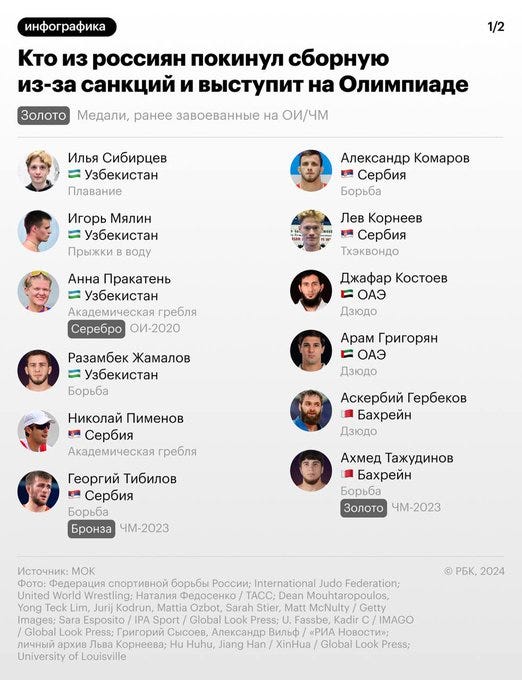
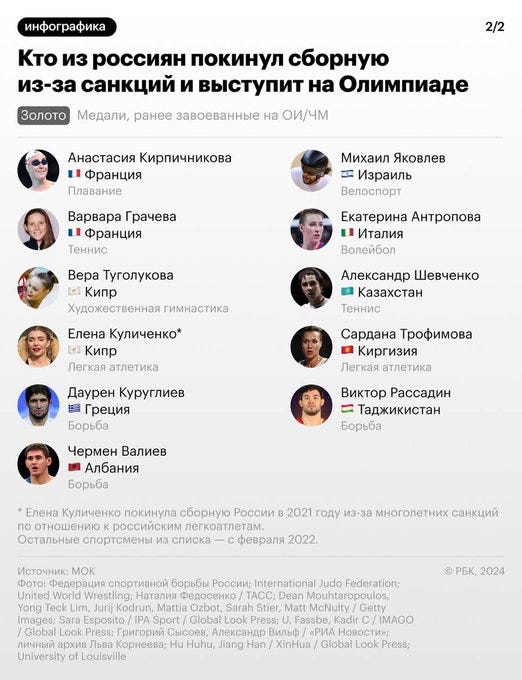
RFE/RL: Russia's Central Bank Raises Key Interest Rate To 18 Percent:
Russia's central bank on July 26 raised its key interest rate by 200 basis points to 18 percent, promising further tightening due to ongoing inflation. The rate brings the cost of borrowing to its highest in more than two years. The key rate was raised to 20 percent in April 2022 shortly after Russia launched its full-scale invasion of Ukraine in late February that year. The central bank also estimated its inflation forecast for 2024 to 7 percent, up from a previous estimate of 4 percent. It projects a decline in annual inflation in 2025 to 4.0 to 4.5 percent.
Gloomy forecast for the Russian Economy: The RCB has admitted that the Russian economy will slow down to almost zero growth next year, inflation will be one and a half times higher than initially forecast, and import supplies will continue to decline.
According to the Central Bank's forecast, after growing by 3.6% last year, Russian GDP will add another 3.5-4% this year, after which the economy may slow down by 7-8 times. In 2025, the Central Bank predicts an increase in GDP of 1.5% in the optimistic scenario and only 0.5% in the pessimistic one. Following economic growth, investment growth, which is estimated at 7-9% this year, may also be reduced to zero. In 2025, capital investment will add 2% at best, and in the worst case, will not grow at all. Russian consumers will also have to tighten their belts, according to the Central Bank: household spending on goods and services will only increase by 0-1%, according to the regulator's forecast.
Me: in other words, a dire prospective with zero growth, and the reduction of imports. The insane defence sector spending will continue given Russian creative accounting, and the fact that they are printing money to sustain it. The interest rate for loans was raised to 18%, but this measure was devised with the intent to discourage the few who are left in the private sector from accessing funds. Inflation would keep increasing more than it is now.
There is no way of knowing exactly how bad things are in Russia because there are very few external checks we can use or available data. Some indicators do exist. Russia made sure to take the rouble off Forex, and has suspended trading in yuan, specifically so that we cannot ascertain the true value of the rouble. In short, the Russian government sets its own exchange rate, and we just don’t know what parametres it is using to set the rate. We don’t know it’s true value.
Russia has a controlled economic system, which means that the Kremlin and its circle manage all aspects of it, and have gamed it for their benefit, not to the needs of the private sector, and foreign companies. In a closed, controlled economy, it is the demands of the state (in this case, Russia’s defence industry above all today) that supercedes the needs of the individual entity. It stymies innovation, and distorts data and production, which is the exact opposition of our economic system. The Kremlin is essentially continuing the practices of the Soviet era.
This system killed the Soviet economy: there was absolutely no incentive for the individual to create or innovate, and more importantly, to be truthful about production outputs to their managers. They lied or they would be on the first train to the gulag. They reported the outputs the central government had set in their 5-Year Plans, irrespective of the reality of production. So the shop manager reported to his Communist Party capo that his department had proudly met the quota of 100 tonnes of refined iron, when in reality it was probably only 50 tonnes. It also meant that you could steal whatever you could, and sell it on the black market. Who was going to check? The Communist Party capo was also taking a cut from the stolen goods.
Today, it’s a similar situation, which came clearly to light in the first weeks of Russia’s full-scale invasion against Ukraine in 2022. They depleted their stocks or had faulty equipment, and Iran, North Korea and China have had to uphold Russia’s war effort ever since. My colleague Olga Lautman had predicted as much in the winter of 2021 because she had followed corruption cases in Russia in key sectors of the economy. Russia will not collapse any time soon. The population under the Kremlin’s control will do without quite a lot, and the Kremlin will make sure the effects of the war will never reach Moscow or St Petersburg to the extent it is affecting regions and republics under its thumb.
We should be prepared for a long war, which will continue killing Ukrainians, if we fail to provide what is necessary for them to beat the Russians back, and should be devising measures to counter grey zone attacks in the West aimed at demoralising us, sowing confusion, and putting a spanner in our united front.
Ambassador Sergiy Kyslytsya: As long as war crimes remain unpunished, aggressors invade UN members and bodies, impunity and hypocrisy reign over UN, no summits of the future, pacts, and well-worded declarations will save present and future generations. “Today’s global order is not working for everyone. In fact, I would go further and say: it’s not working for anyone” - according to Antonio Guterres. Breaking the cycle of impunity is a way to lay firm ground for the future, if of course UN members are truly serious about the fate of future generations!
Andrei Soldatov & Irina Bogodan: Kremlin Jails the Father of Russia’s Internet
Alexey Soldatov, a Russian Internet pioneer and a founder of the first Internet provider in the country, has been sentenced by a court to two years in a labor colony on charges of “abuse of power.” Soldatov, 72, had been detained by a court in Moscow. He is terminally ill.
Very few in Russia believe in the government charges against a man widely known as a Father of the Russian Internet — and who is less well known as the father of Andrei Soldatov, one of this article’s authors.
Soldatov was accused of abuse of power when managing a pool of IP-addresses by an organization he had no position at. This legal absurdity was enough to see him imprisoned even though the court knew of Soldatov’s illness, which meant the court had no legal right to pass a custodial sentence. His family believes that the decision is essentially a death sentence.
Soldatov, a nuclear physicist by training, made his career in the Kurchatov Institute of Atomic Energy, a leading Soviet nuclear research facility during the Cold War. In addition to research on atomic weapons, scientists at the Kurchatov were involved in many crucial defense projects, ranging from Soviet nuclear submarines to laser weapons. As a result, the institute held an exalted status in the Soviet Union.
Because of that, the institute enjoyed a degree of freedom unthinkable for other Soviet research centers. Among other things, it meant the institute had a phone line capable of making international calls, something unthinkable at almost any other institution.
Vlad Vexler explains the difference between Soviet propaganda and what is on offer today.
Allied Support
Ukrainian cities will receive 68 more large generators for critical infrastructure from the European Union. The aid is delivered together with the humanitarian program of the German government.
The matrioska doll isn’t Russian, it’s Japanese. Of course they stole it. Japan demands that the Russian stolen Fukurama doll be returned to Japan. "Russia has built its culture by stealing from others".
New Russian information operation alert: Lifting the oil cap will crash the Russian economy. This idea took shape in the Insider and another Russian publication and will be picked up by other Western media outlets in the weeks to come: Business Insider is the first.
While most western economists are saying that the oil price cap should actually be reduced to $30 USD from the current $60 USD, economist Vladislav Inozemtsev offers an alternative proposal: lifting all restrictions on Russian oil and gas in order to bring about a collapse in energy prices, then redirecting the funds currently being used to compensate European consumers towards increased aid for Kyiv.
The idea is that Russia would begin producing more and that this would decrease the price of oil worldwide. Everyone I’ve talked to has said that Russia would not increase oil production but find a way of weaponising the system along with other OPEC partners to make the most of the lifting of sanctions and price cap. What we should be doing it taking the fight to Russia with regards the shadow fleet (estimated at 60 ships), and other economic measures that put pressure on businesses that are still dealing with Russia.
Official Readout: Secretary of State Antony J. Blinken met with PRC Director of the CCP Central Foreign Affairs Commission and Foreign Minister Wang Yi in Vientiane, Laos, on the margins of the ASEAN-related ministerial meetings on July 27.
The two sides had open and productive discussions on key bilateral, regional, and global issues. Secretary Blinken emphasized the importance of continuing to use diplomacy to responsibly manage competition, to candidly discuss areas of difference, and to make progress on areas of cooperation that matter to the American people and the world. He pressed for continued implementation of the leaders’ Woodside Summit commitments, acknowledging recent steps taken by the PRC to advance counternarcotics cooperation to disrupt the flow of synthetic drugs into the United States and to enhance military-to-military communication to prevent miscalculation and conflict. The Secretary reiterated that the United States will continue to take necessary actions to safeguard our interests and values, and those of our allies and partners, including on human rights. He underscored that it remains a top priority to resolve the cases of American citizens who are wrongfully detained or subject to exit bans in China.
The Secretary made clear that the United States, together with our allies and partners, will advance our vision for a free and open Indo-Pacific. He emphasized the importance of maintaining peace and stability across the Taiwan Strait. The Secretary raised concerns about the PRC’s destabilizing actions in the South China Sea, including at Second Thomas Shoal, and affirmed the United States’ support for freedom of navigation and overflight and the peaceful resolution of disputes, consistent with international law. The Secretary reiterated serious concern with PRC support for Russia’s defense industrial base and made clear that if the PRC does not act to address this threat to European security, the United Stares will continue to take appropriate measures to do so. He also discussed the DPRK’s provocative actions and underscored the need to work with the region to address the deteriorating situation in Burma. The Secretary updated the Foreign Minister on recent work to achieve a ceasefire to the war in Gaza and emphasized the importance of reaching an agreement without delay.
Areas of convergence and competition:
The context for this meeting was within the ASEAN Ministerial Conference, and the Mekong-U.S. Partnership (MUSP), in Vientiane, DPR Loa (Laos). Secretary Blinken also met with his counterpart from Loas, Foreign Minister Saleumxay Kommasith, today on the sidelines.
China is trying its best to dominate and control the South China Sea, and outer perimetres, which means it is in direct rivalry with the US and its partners.
The US continues to increase its posture in the Indo-Pacific through the ASEAN, enhancing strategic relationships with Japan, South Korea, the Philippines, and Australia, and is trying to reach out to Vietnam, Laos, and Thailand through the Mekong partnership. It is in the national interests of the US to keep the sea lanes free for international commerce, but China doesn’t see it this way.
America’s posture in the Indo-Pacific is improving: some NATO members have instituted ties to countries in the Indo-Pacific via various fora over the past two years.
Areas where US national interests and those of its Chinese counterpart overlap are in issues concerning climate change, non-proliferation of nuclear weapons (Iran and North Korea), and in the development of AI technology applied to military uses. The Chinese have said that they agree with the US when it comes to machine decision-making, especially in the realm of tactical nuclear weapons and other long-range armaments. These were topics discussed by Biden and Xi when they met in San Francisco in the late spring.
"On June 6, we took steps to impose visa restrictions on dozens of Georgian ruling party officials, parliamentarians, and law enforcement personnel responsible for or complicit in undermining democracy in Georgia. These steps built on our previous actions, such as visa restrictions on corrupt judges and financial sanctions on FSB-linked Georgian-Russian oligarch Otar Partskhaladze"
Sova: Deputy Chairman of the Federation Council Klimov on possible assistance to the Georgian Dream
Russia is ready to help the Georgian Dream retain power if Tbilisi turns to Moscow with this request, said Deputy Chairman of the Federation Council Andrei Klimov at a meeting of the Friends of Russia Club in Moscow, writes the website of the TV Pirveli television company.
The journalist asked Andrey Klimov whether Russia was ready to prevent an attempt at a coup in Georgia. In answering this question, Klimov drew a parallel with Syria and, using Bashar al-Assad as an example, stated that those who turn to Russia receive military assistance.
"Any coup d'etat is an interference of external forces in the internal affairs of another state, which is a violation of the UN Charter. I will tell you something else, for example, there was an attempt to overthrow the state in Syria.
What’s up in the States…
Last weekend was the moment when everything changed in the presidential election. No one was more in shock than the Russians. When Biden stepped down from the nomination for the up-coming election in November, Russian accounts were silent. Initial Russian reactions were actually ridiculous, characterised by racial slurs and something about a coconut. They had planned for Biden, and whatever they had prepared is now unusable.
Then after the Vance offensive comments, the Russians began getting nervous. Check out Julia Davis’s YouTube channel for the clips dedicated to the assessment of Trump’s campaign.
Speaking of whom, Trump spoke at an event hosted by Turning Point USA, which is a Christian organisation, presided over by Charlie Kirk. In the 2020 presidential elections, the Evangelicals and other Christian voters did not turn out in droves for Trump, so he’s making sure to try to bring them on board with a platform that panders to their desires. There’s been much debate about the statements in this clip below: was he really saying there won’t be elections anymore if he wins the election come November? Given his past record on disrespecting the vote, I would say so.
The Philippines continues to strengthen its relations with U.S. allies. The country's defense secretary recently highlighted plans for defense agreements with France, Canada and New Zealand. The treaties would allow military personnel from these countries to stay in the Philippines for exercises.
Creating a network of defense partnerships is in itself beneficial to the Philippines. The increased attention could attract investment in the military, which is experiencing a number of problems related to modernization, among other things.
CNN: US operation to capture the Sinaloa cartel leaders had inside help, official says
The US operation to capture the Sinaloa cartel leaders had the inside help of one of Chapo Guzman’s sons, according to US law enforcement official briefed on the investigation.
Ismael Zambada Garcia, known as “El Mayo,” and who the US says runs a Sinaloa faction that has fueled the fentanyl trafficking into the US, boarded a plane with Joaquin Guzman Lopez, believing they were inspecting property in Mexico near the US border.
DFRLab: How Venezuela became a model for digital authoritarianism.
Once the most vigorous democracy in Latin America, Venezuela started down a slow path toward autocracy twenty-five years ago. It also became a model for digital authoritarianism and an exporter of democratic backsliding to the rest of the Americas. Control of the information space, widespread surveillance, and digital repression are significant pillars of the current regime’s survival. Incumbent Nicolás Maduro is counting on this, along with electoral manipulation and judicial control, to remain in power as Venezuela holds a presidential election on July 28. Nonetheless, a cohesive democratic coalition mobilizing the population across the country has a serious chance of making this election the starting point for a transition toward re-democratization.
The media landscape in Venezuela is fragmented and marked by censorship. The rise of government-run media and state control through ownership changes or censorship mechanisms led independent journalists to migrate to small internet outlets. Venezuela’s media ecosystem shrank further when the country’s economy collapsed after 2015. The aftermath of the 2017 cycle of protests saw another significant shift in the media landscape, with surviving newscasts characterized by censorship and heavily biased coverage in favor of the ruling party. In addition, censorship has caused the closure of many radio stations, leaving many areas without access to local or regional news. The National Telecommunications Commission in Venezuela routinely censors the use of certain topics and words during programming, and also bans interviews with democratic opposition leaders. It prohibits public coverage of corruption allegations or human rights violations attributed to state officials or their family members, coverage of citizen protests or demonstrations against the regime, and discussion of international courts and other human rights entities.
Inside Story: Have you ever heard of the term ‘soft power’? It was coined by Robert S Nye Jr.
Joseph Nye, the man who invented the concepts of “soft power” and “smart power” and set them beside “hard power.” Described by one of his Washington contemporaries as “the Grandmaster of the study of power,” Nye coined soft power to describe the ability to attract and co-opt rather than coerce. The United States could use culture and communications to influence the decisions and behaviour of others in ways that military force could not reach. Nye stands with Talleyrand, who advised Napoleon: “You can do anything you like with bayonets, except sit on them.”
Military power can bully, economic power can buy, but soft power is blarney magic.
Hard power rests on command, coercion or cash — “the ability to change what others do.” Soft co-optive power, Nye wrote in his 1990 book on the changing nature of American power, is “the ability to shape what others want” through attraction.
Millions of Google citations show the reach of soft power, Nye writes, but “the most surprising was in 2007 when the president of China declared soft power to be their national objective.” For Nye, the result was “countless requests for interviews, including a private dinner in Beijing when the foreign minister asked me how China could increase its soft power. A concept I outlined while working at my kitchen table in 1989 was now a significant part of the great power competition and discourse.” [continue]
Fun stuff: are you travelling around Italy this summer? You’ll want to note that along the main highways, you’ll see ‘autogrill’ signs or service station signs. These are what Americans call coffee shops, but for Italians they’re a combination of the coffee shop, supermarket, book store, electrontics store, and gas station. You’ll find whatever you need for your journey, but the food is the main attraction, of course. Wherever you are, you’ll also find local delicacies and wines. There’s no need to pack a lunch because they’re inexpensive and feature hot food too. The one in the video is a chain that’s mostly found in southern Italy. As we were travelling to Pescara, we stopped at one along the way, and I couldn’t believe they had fried pizza.
I must say that I’ve found a few in France that are comparable for quality, but superior in services. Some of them in southern France have kiddy parks and camping services.

